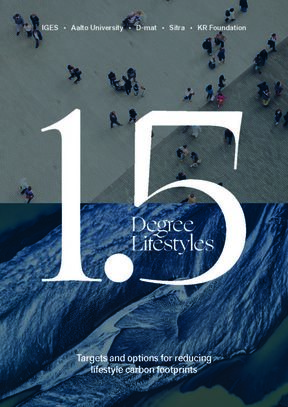1.5 Degree Lifestyles

If the world is to keep climate change at manageable levels before the middle of the century, changes in lifestyles are not only inevitable, but would need to be radical, and start immediately. Considering current consumption levels, citizens in many developed countries would have to cut their lifestyle carbon footprints by about 80-90% or more, and some in developing countries by about 30-80% within the next 30 years. This is one of the key messages coming from the report “1.5-Degree Lifestyles: Targets and options for reducing lifestyle carbon footprints,” just launched by a group of experts from an international consortium of research and policy institutes.
The Institute for Global Environmental Strategies (IGES), Aalto University, D-mat, the Finnish Innovation Fund Sitra, and the KR Foundation, at the World Resources Forum (WRF), today announced the launch of a report which analyses the carbon footprints of household lifestyles and how changes can contribute to meeting the ambitious 1.5-degree aspirational target envisaged by the Paris Agreement on climate change. Findings in the publication make it clear that changes in consumption patterns and dominant lifestyles are a critical and integral part of the solutions package for addressing climate change. It analyses scientific emission scenarios and case studies from Finland, Japan, China, Brazil, and India, and proposes long-term targets for individuals’ lifestyle carbon footprints by 2030-2050, as well as low-carbon options that citizens and society can adopt.
The report provides a unique analysis of potential implications of the Paris Agreement from a lifestyle perspective, whereas most existing studies predominantly focus on production- and technology-based solutions. The publication establishes the first global per-capita lifestyle carbon footprint targets for 2030 to 2050 with explicit linkages to the 1.5-degree target. It also proposes an indicator of “lifestyle carbon footprint,” a consumption-based greenhouse gas accounting used for establishing targets, examining current status, and identifying solutions. Its comprehensive series of analyses focus on the climate impacts of household lifestyles and can be further expanded to countries beyond the selected case studies.
“With this report, we can no longer wait for another ten or twenty years to take action,” said Professor Kazuhiko Takeuchi, President of IGES. “Policymakers and businesses should recognise the urgency and actively support citizens in realising low-carbon lifestyles, looking ahead to a decarbonised society by 2050.”
Bas de Leeuw, Managing Director of the World Resources Forum and Member of the Club of Rome welcomed the report and called it an important contribution to the newly released Club of Rome “Climate Emergency Plan” that sets out 10 priority actions for all sectors and governments. “With children and students taking to the streets and populists trying to derail the debate, this report is very timely,” Bas de Leeuw said of the 1.5-Degree Lifestyles report. He added that, “The report is crystal clear in its analysis and solid in its conclusions. Climate change and resources management are linked, you can’t solve the one without addressing the other. Consumers will indeed need to change their lifestyles, but they are not alone. Much of the reduced impact of their lifestyles needs to come from smarter and more resource efficient products and services.”
Michael Lettenmeier, one of the authors of the report from Aalto University, commented that “while doing this research we were surprised to note what a small role lifestyles had played in most existing scenarios on greenhouse gas emissions. Lifestyles can and must contribute to climate change mitigation, but not only households must act. Governments and businesses have to facilitate lifestyle changes by providing infrastructure, products and services that enable households to live more sustainably. These changes have to be initiated now because lifestyle carbon footprints have to drop far below half in the course of one decade in order to keep global warming within 1.5 degree.”
Key findings of the report
- 3-2-1 tonnes per person by 2030-2040-2050. Globally, citizens and society need to aim for per-person consumption-based greenhouse gas emissions targets of 2.5 (tCO2e) in 2030, 1.4 by 2040, and 0.7 by 2050 in order to keep global temperature rise to within 1.5 degrees. The gap analysis reveals that footprints in the developed countries studied (Finland and Japan) must be reduced by 80–93% by 2050, assuming that actions for a 58–76% reduction, necessary to achieve the 2030 target, start immediately. Even for the developing countries studied (China, Brazil, and India), a 23–84% reduction, depending on the country and the scenario, would be required by 2050.
- What we eat, how we live and move. Nutrition, housing, and mobility have the largest impact on climate change, accounting for approximately 75% of lifestyle carbon footprints. Hotspots include meat and dairy consumption, fossil-fuel-based energy, car use, and air travel.
- Low-carbon lifestyles. Options with large emission reduction potentials include car-free travel and commuting, ride-sharing, living closer to workplaces and in smaller living spaces; renewable grid electricity and off-grid energy, heat pumps for temperature control; and vegetarian-vegan diets, and substituting dairy products and red meat with plant-based options. If these options are fully adopted, each of them could reduce per-capita footprint by several hundred kg to over a tonne annually.
- The limits of technology. The various reduction scenarios studied indicate that most of the existing emission scenarios assume extensive use of negative emission technologies and production-side efficiency improvement. Only a few scenarios for the 1.5-degree target have focused on lifestyle changes and demand-side actions. However, the actual availability, feasibility, and costs of technologies are uncertain, and thus solely relying on their assumed extensive and broad-ranging roll-out is a risky societal decision.
Main messages
- The required levels of emission reductions, exceeding 80-90% based on current lifestyle carbon footprints, thus imply a radical rethink of sustainability governance and the need for new business models to shift the paradigms on which we base infrastructure, economies, and consumer lifestyles. Reductions will be necessary not only for developed countries; several developing countries will also need to reduce average per capita footprints from current levels, implying the importance of long-term strategic planning and actions to achieve both the 1.5-degree target and quality of life for citizens.
- A variety of low-carbon lifestyle options is becoming available, yet these options should be strategically developed, tested, and further promoted. The three key approaches of low-carbon lifestyles highlighted in the report, absolute reduction, modal shift, and efficiency improvement, are all indispensable parts of the solutions. In particular, shifting consumption modes from high-carbon to low-carbon and reducing the physical amount of consumption while keeping quality of life should be seen as an integral part of solutions to climate change, complementing technology-based solutions.
- Citizens’ lifestyles are “locked-in” by the existing infrastructure and product availability, and the shift in lifestyles is not the sole responsibility of consumers and their individual choices. All stakeholders, including national and local governments and businesses, need to urgently act to develop and provide viable and attractive solutions, including low-carbon products and services and the design of infrastructure-supporting low-carbon solutions, in parallel with facilitating behaviour changes among citizens.
The “1.5-Degree Lifestyles” project was conceived as part of the Absolute REDUCTIONS project (“Reducing Environmental Degradation & Unsustainable Consumption Trends & Impacts On Nature & Society: Research, Policy and Practice”) in collaboration with the Hot or Cool network of scientists and practitioners, and the research for this report was conducted by IGES, Aalto University, and D-mat and financially supported by the Finnish Innovation Fund Sitra and the KR Foundation. A translated version of summary reports and related information is expected to be announced later in Finland and Japan.
For more information please contact
Institute for Global Environmental Strategies (IGES)
Rie Sugihara, Kanae Sho
Tel: +81-46-855-3700 Email: iges_pr@iges.or.jp
Aalto University
NODUS Research Group on Sustainable Design
Post doctoral researcher Michael Lettenmeier
Tel: +358-40-54 12 876 Email: michael.lettenmeier@aalto.fi
About IGES
IGES is an international research institute conducting practical and innovative research for realising sustainable development both in the Asia-Pacific region and globally. Its practical research activities cover a wide range of areas such as climate change, natural resources management, sustainable consumption and production, and green economy in cooperation with international organisations, governments, research institutes, businesses and NGOs. The Institute, established in 1998 with support from the Japanese government and Kanagawa Prefecture. It has its headquarters in Hayama, with offices in Tokyo, Kansai (Hyogo Prefecture), Kitakyushu, Beijing and Bangkok.
About Aalto University
Aalto University is a multidisciplinary community of bold thinkers, where science and art meet technology and business. We are committed to identifying and solving grand societal challenges and building an innovative future. Aalto University has six schools with 12 000 students and 400 professors. Our campus is located in Espoo, Finland.
About D-mat
D-mat is a consulting and research company enabling public and private organisations as well as private people to understand the challenges and opportunities related to our sustainable future. D-mat’s main approach is material and carbon footprint calculation. D-mat has produced several tools and methodologies for calculating, benchmarking and reducing footprints.
About Sitra
The Finnish Innovation Fund Sitra is a future fund that collaborates with partners from different sectors to research, trial and implement bold new ideas that shape the future. Our aim is a Finland that succeeds as a pioneer in sustainable well-being.
About KR Foundation
The mission of KR Foundation is to help provide answers to, stimulate mind shifts about, and encourage action on, the long-term challenges faced by current and future generations living on a planet with finite resources, fragile ecosystems, and climate change. KR Foundation was established by VILLUM FONDEN and the descendants of civil engineer Villum Kann Rasmussen. It is based in Copenhagen, Denmark, but works internationally.
About World Resources Forum
World Resources Forum (WRF) is the independent global platform that connects and fosters knowledge exchange on resources management amongst business leaders, policy-makers, NGOs, researchers and the public. This Swiss-based non-profit association is known for its annual flagship conferences, and multistakeholder dialogue activities, such as the FORAM, CEWASTE and CICERONE H2020 projects, and the Swiss funded Sustainable Recycling Industries (SRI) programme.
Cold choices for a warming planet
A new study from Finland and Japan lays out the massive extent to which our lifestyles need to change if we are to slow down global warming.







